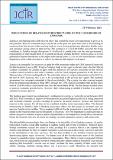| dc.contributor.author | Jesuit Centre for Theological Reflection | |
| dc.date.accessioned | 2023-02-22T12:28:16Z | |
| dc.date.available | 2023-02-22T12:28:16Z | |
| dc.date.issued | 2023-02-21 | |
| dc.identifier.uri | https://hdl.handle.net/20.500.14274/1672 | |
| dc.description.abstract | Zambia is still battling with a debt distress which has denied the country the opportunity to grow at its full potential. This has worsened the poverty levels as the past few years have seen a rechannelling of resources from key sectors of the economy such as: social security protection; education; health; water and sanitation among others to debt serving. The coming in of Covid-19 further worsened the living conditions in Zambia through disruptions of livelihood as productivity was lost and government’s responsibility to meet health needs of its people increased. Zambia therefore needs to grow to its full potential to improve livelihoods of its people and eradicate poverty. It is for this reason that the country desperately needs a debt restructure to unlock investment and improve fiscal space. | en |
| dc.publisher | Jesuit Centre for Theological Reflection | en |
| dc.rights | Attribution-ShareAlike 3.0 United States | * |
| dc.rights.uri | http://creativecommons.org/licenses/by-sa/3.0/us/ | * |
| dc.subject | Article | en |
| dc.subject | Debt | en |
| dc.subject | Economic Growth | en |
| dc.subject | Debt Management | en |
| dc.title | Implications of Delayed Debt Restructuring on the Livelihoods of Zambians | en |
| dc.type | Article | en |

